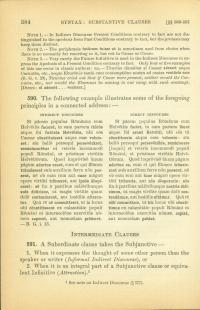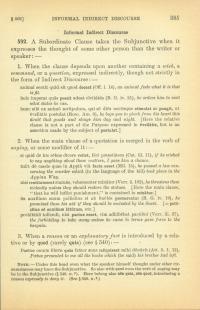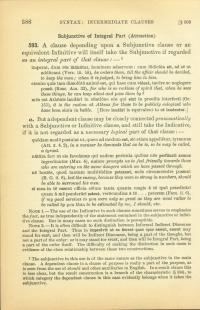591. A Subordinate clause takes the Subjunctive:
- When it expresses the thought of some other person than the speaker or writer (Informal Indirect Discourse), or
- When it is an integral part of a Subjunctive clause or equivalent Infinitive (Attraction).1
Informal Indirect Discourse
592. A Subordinate Clause takes the Subjunctive when it expresses the thought of some other person than the writer or speaker:
- When the clause depends upon another containing a wish, a command, or a question, expressed indirectly, though not strictly in the form of Indirect Discourse.
Animal sentit quid sit quod deceat.(Off. 1.14) An animal feels what it is that is fit.
Huic imperat quās possit adeat cīvitātēs. (B. G. 4.21) He orders him to visit what states he can.
Hunc sibi ex animō scrūpulum, quī sē diēs noctīsque stimulat ac pungit, ut ēvellātis postulat. (Rosc. Am. 6) He begs you to pluck from his heart this doubt that goads and stings him day and night. [Here the relative clause is not a part of the Purpose expressed in ēvellātis, but is an assertion made by the subject of postulat.]
- When the main clause of a quotation is merged in the verb of saying, or some modifier of it.
Sī quid dē hīs rēbus dīcere vellet, fēcī potestātem. (Cat. 3.11) If he wished to say anything about these matters, I gave him a chance.
Tulit dē caede quae in Appiā viā facta esset.(Mil. 15) He passed a law concerning the murder which (in the language of the bill) took place in the Appian Way.
Hisi restituissent statuās, vehementer minātur. (Verr. 2.162) He threatens them violently unless they should restore the statues. [Here the main clause, that he will inflict punishment, is contained in minātur.]
Iīs auxilium suum pollicitus sī ab Suēbīs premerentur. (B. G. 4.19) He promised them his aid if they should be molested by the Suevi. [ = pollicitus sē auxilium lātūrum, etc.]
Prohibitiō tollendī, nisi pactus esset, vim adhibēbat pactiōnī. (Verr. 3.37) The forbidding to take away unless he came to terms gave force to the bargain.
- When a reason or an explanatory fact is introduced by a relative or by quod (rarely quia) (see § 540).
Paetus omnīs librōs quōs frāter suus relīquisset mihi dōnāvit. (Att. 2.1.12) Pœtus presented to me all the books which (he said) his brother had left.
Note— Under this head even what the speaker himself thought under other circumstances may have the Subjunctive. So also with quod even the verb of saying may be in the Subjunctive (§ 540, Note2). Here belong also nōn quia, and nōn quod, introducing a reason expressly to deny it. (See § 540, Note 3.)
Subjunctive of Integral Part (Attraction)
593. A clause depending upon a Subjunctive clause or an equivalent Infinitive will itself take the Subjunctive if regarded as an integral part of that clause.2
Imperat, dum rēs iūdicētur, hominem adservent: cum iūdicāta sit, ad sē ut addūcant. (Verr. 3.55) He orders them, till the affair should be decided, to keep the man; when it is judged, to bring him to him.
Etenim quis tam dissolūtō animō est, quī haec cum videat, tacēre ac neglegere possit? (Rosc. Am. 32) For who is so reckless of spirit that, when he sees these things, he can keep silent and pass them by?
Mōs est Athēnīs laudārī in cōntiōne eōs quī sintin proeliīs interfectī. (Or. 151) It is the custom at Athens for those to be publicly eulogized who have been slain in battle. [Here laudārī is equivalent to ut laudentur.]
a. But a dependent clause may be closely connected grammatically with a Subjunctive or Infinitive clause, and still take the Indicative, if it is not regarded as a necessary logical part of that clause.
Quōdam modō postulat ut, quem ad modum est, sīc etiam appellētur, tyrannus (Att. 10.4.2) In a manner he demands that as he is, so he may be called, a tyrant.
Nātūra fert ut eīs faveāmus quī eadem perīcula quibus nōs perfūnctī sumus ingrediuntur. (Mur. 4) Nature prompts us to feel friendly towards those who are entering on the same dangers which we have passed through.
ē hostēs, quod tantum multitūdine poterant, suōs circumvenīre possent (B. G. 2.8) lest the enemy, because they were so strong in numbers, should be able to surround his men
sī mea in tē essent officia sōlum tanta quanta magis ā tē ipsō praedicārī quam ā mē ponderārī solent, verēcundius ā tē . . . peterem (Fam. 2.6) if my good services to you were only so great as they are wont rather to be called by you than to be estimated by me, I should, etc.
Note 1— The use of the Indicative in such clauses sometimes serves to emphasize the fact, as true independently of the statement contained in the Subjunctive or Infinitive clause. But in many cases no such distinction is perceptible.
Note 2— It is often difficult to distinguish between Informal Indirect Discourse and the Integral Part. Thus in imperāvit ut ea fierent quae opus essent, essent may stand for sunt, and then will be Indirect Discourse, being a part of the thought, but not a part of the order; or it may stand for erunt, and then will be Integral Part, being a part of the order itself. The difficulty of making the distinction in such cases is evidence of the close relationship between these two constructions.
Footnotes
2. The Subjunctive in this use is of the same nature as the Subjunctive in the main clause. A dependent clause in a clause of purpose is really a part of the purpose, as is seen from the use of should and other auxiliaries in English. In a result clause this is less clear, but the result construction is a branch of the characteristic (§ 534), to which category the dependent clause in this case evidently belongs when it takes the subjunctive.



